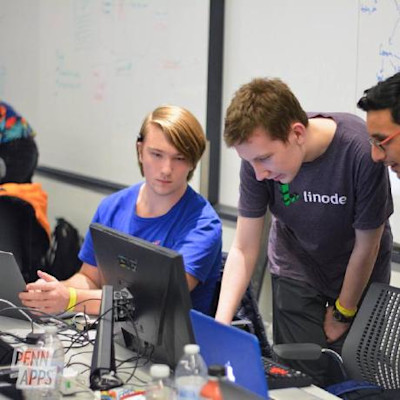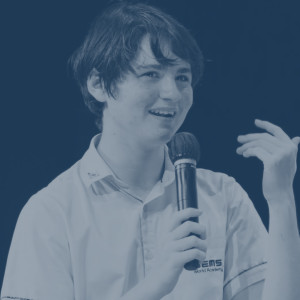Hugo Burbelo, 21

In another life without the hacker community, Hugo would be applying to law school right now. He attended his first hackathon Hack TJ, a local event for high school students, without knowing anyone inside, yet upon walking into the venue with his oversized sleeping bag he instantly thought, “these are my people.” Before learning of the hacker community, Hugo viewed tech as a boring and “weird” industry, but he quickly realized that hackathons embody the best of the technology community: innovative, risk-taking, dedicated, and passionate people who build things out of love rather than for money. He had planned on studying history and philosophy at university to pursue law, but his experiences at Hack TJ, PennApps, MHacks, and more changed this vision for him, and he instead declared computer science and philosophy majors.
Hugo sat down in the Hack TJ auditorium next to a stranger who would come to be his teammate and great friend, Liam. Hugo’s team built a hack that gave “grades” to representatives in congress based on how well they interact with their constituents on social media. The project ended up winning the Best Civic Technology App prize, and the COO of the prize’s corporate sponsor was so impressed with the hack that they offered the team a summer internship to keep working on it. Hugo loves hackathons because they provide an unparalleled space to innovate and test new ideas without fear of failure alongside many other interesting and creative students from across the globe. The project eventually turned into FeedScore, and the team even demoed it at the Consumer Electronics Show in Las Vegas, the largest technology exhibition in the world! FeedScore analyzes millions of social media posts using a proprietary sentiment analysis algorithm in order to provide real-time insights about public opinions regarding various political issues. Hack TJ sparked Hugo’s interest in technology and hackathons, and if he had never sat down next to Liam then he probably would not be working in tech today.
An example of innovation that jumped to Hugo’s mind was at PennApps in winter 2018. Hugo’s team wanted to build an augmented reality drone racing hack (like Mario Kart with first-person drones and courses made from augmented reality objects), but after several hours of work, heavy rain settled in and any work involving drones was suddenly impossible. Team morale was low as they scrapped the project and started to think of a new idea, but after taking time to breathe and focus, they pivoted to something that could leverage their existing work to a similar end: an augmented reality car racing hack, DeREZ. DeREZ combined the thrill of first-person view car racing with the power of augmented reality, and they were able to render an augmented reality racing course for an RC car, visible through an Oculus Rift. The team stayed calm and tight-knit through the rest of the development, which made a much more tangible difference in their results than their technical competence. They had a ton of fun and learned a lot about persistence and creativity in rolling with the punches.
Hugo’s professional aspirations intersect product management and software development, and he believes the future of product teams will involve contributors with balanced understandings of both technical aptitude and product awareness, instead of current assembly-line models with specialized individual contributors. He has strong product management skills in product ideation, UX strategy, and market positioning, but also a high level of technical competency. The best product managers he has worked with were former engineers with a well-rounded view of both engineering and business perspectives. Hackathons have allowed Hugo to explore both pathways, being a product manager for some projects and an engineer for others. Hugo hopes to one day leverage the experiences he has gained at hackathons to lead his own product team.
At PennApps XIX, Hugo created his favorite hack: jobFAIR. Hugo was inspired by a recent article that exposed how Amazon’s internal recruiting tool was biased against female and minority applicants because the algorithm was trained with a majority of white male engineering applicants. JobFAIR is an alternative hiring solution, providing interview recommendations to HR personnel by training a machine learning algorithm on past interview data while using a reweighting algorithm that mitigates bias against applicants from underrepresented backgrounds. Hugo was also inspired by his own experiences in tough job selection processes, and he wants to ensure that each applicant has a fair and unbiased chance at being selected, with hiring decisions made based on talent and not a biased algorithm. On top of building the frontend admin interface in Vue.js, he handled product management for the hack: concept ideation, user research, and crafting the value proposition. This was his first hackathon project that delved deep into data science and the first one where he didn’t use hardware—he wanted a challenge to explore outside his comfort zone. JobFAIR won the AI/ML prize and claimed 3rd place at the event.
In 2020, Hugo helped organize Technica, the largest hackathon in the world for women and non-binary individuals. As part of Technica, Hugo led the development of a custom virtual hackathon platform for the event, as the pandemic left them unable to host in person. After evaluating dozens of existing options, the team realized that conventional virtual event solutions were not made for hackathons and could not replicate the magical in-person experience for an online event—so they built their own platform.
In just four months of development, the Technica virtual platform created a world-class virtual event experience for hackathon attendees, leveraging technology solutions such as Zoom, Slack, Twilio, and Intercom. The system includes an intuitive registration and login system, an embedded schedule, and support for dozens of virtual workshops, games, and meetups. The platform also provides completely custom hackathon-specific features such as seamless mentorship requests, a custom sponsorship fair, and multiple dedicated virtual spaces for hackers to collaborate.
Technica virtual platform was tested at two partnered hackathons before being used at Technica. The platform was immensely successful at each event, working as expected with thousands of concurrently active users, and Hugo’s team received numerous compliments from hackers, mentors, and sponsors about the quality of the experience and how easy the platform was to use. Due to the success of Technica and the growing need for a viable virtual event platform in the hackathon community, Hugo’s team has received dozens of inquiries from other hackathons and corporate sponsors about using the platform for their events, and they are working to share the platform with the entire hackathon community.
Hugo is excited to expand the work he has done with Technica through 2021, as he assumes the new role of co-executive director of the organization with the mission of building the preeminent brand in the world to promote gender diversity in tech and beyond. He hopes to develop more innovative products and initiatives to usher in a new chapter of Technica’s growth and sustainability, one where they reduce reliance on corporate sponsorships and instead fund the organization through licensing products such as the platform.
The construction of this platform should demonstrate to the hacker community that when you see a problem, you should have the courage to try and solve it, even when others say it is too risky or challenging. Many team members told Hugo that what they were planning was crazy—how could a team of students build such a complex and demanding product in a short time with a limited budget? The reality is that hackers have much more potential than they think, and sometimes it just takes the guts to act on it and go against conventional thinking in order to achieve success and build a better community for everyone.
Quick Facts

Hugo Burbelo, 21

In another life without the hacker community, Hugo would be applying to law school right now. He attended his first hackathon Hack TJ, a local event for high school students, without knowing anyone inside, yet upon walking into the venue with his oversized sleeping bag he instantly thought, “these are my people.” Before learning of the hacker community, Hugo viewed tech as a boring and “weird” industry, but he quickly realized that hackathons embody the best of the technology community: innovative, risk-taking, dedicated, and passionate people who build things out of love rather than for money. He had planned on studying history and philosophy at university to pursue law, but his experiences at Hack TJ, PennApps, MHacks, and more changed this vision for him, and he instead declared computer science and philosophy majors.
Hugo sat down in the Hack TJ auditorium next to a stranger who would come to be his teammate and great friend, Liam. Hugo’s team built a hack that gave “grades” to representatives in congress based on how well they interact with their constituents on social media. The project ended up winning the Best Civic Technology App prize, and the COO of the prize’s corporate sponsor was so impressed with the hack that they offered the team a summer internship to keep working on it. Hugo loves hackathons because they provide an unparalleled space to innovate and test new ideas without fear of failure alongside many other interesting and creative students from across the globe. The project eventually turned into FeedScore, and the team even demoed it at the Consumer Electronics Show in Las Vegas, the largest technology exhibition in the world! FeedScore analyzes millions of social media posts using a proprietary sentiment analysis algorithm in order to provide real-time insights about public opinions regarding various political issues. Hack TJ sparked Hugo’s interest in technology and hackathons, and if he had never sat down next to Liam then he probably would not be working in tech today.
An example of innovation that jumped to Hugo’s mind was at PennApps in winter 2018. Hugo’s team wanted to build an augmented reality drone racing hack (like Mario Kart with first-person drones and courses made from augmented reality objects), but after several hours of work, heavy rain settled in and any work involving drones was suddenly impossible. Team morale was low as they scrapped the project and started to think of a new idea, but after taking time to breathe and focus, they pivoted to something that could leverage their existing work to a similar end: an augmented reality car racing hack, DeREZ. DeREZ combined the thrill of first-person view car racing with the power of augmented reality, and they were able to render an augmented reality racing course for an RC car, visible through an Oculus Rift. The team stayed calm and tight-knit through the rest of the development, which made a much more tangible difference in their results than their technical competence. They had a ton of fun and learned a lot about persistence and creativity in rolling with the punches.
Hugo’s professional aspirations intersect product management and software development, and he believes the future of product teams will involve contributors with balanced understandings of both technical aptitude and product awareness, instead of current assembly-line models with specialized individual contributors. He has strong product management skills in product ideation, UX strategy, and market positioning, but also a high level of technical competency. The best product managers he has worked with were former engineers with a well-rounded view of both engineering and business perspectives. Hackathons have allowed Hugo to explore both pathways, being a product manager for some projects and an engineer for others. Hugo hopes to one day leverage the experiences he has gained at hackathons to lead his own product team.
At PennApps XIX, Hugo created his favorite hack: jobFAIR. Hugo was inspired by a recent article that exposed how Amazon’s internal recruiting tool was biased against female and minority applicants because the algorithm was trained with a majority of white male engineering applicants. JobFAIR is an alternative hiring solution, providing interview recommendations to HR personnel by training a machine learning algorithm on past interview data while using a reweighting algorithm that mitigates bias against applicants from underrepresented backgrounds. Hugo was also inspired by his own experiences in tough job selection processes, and he wants to ensure that each applicant has a fair and unbiased chance at being selected, with hiring decisions made based on talent and not a biased algorithm. On top of building the frontend admin interface in Vue.js, he handled product management for the hack: concept ideation, user research, and crafting the value proposition. This was his first hackathon project that delved deep into data science and the first one where he didn’t use hardware—he wanted a challenge to explore outside his comfort zone. JobFAIR won the AI/ML prize and claimed 3rd place at the event.
In 2020, Hugo helped organize Technica, the largest hackathon in the world for women and non-binary individuals. As part of Technica, Hugo led the development of a custom virtual hackathon platform for the event, as the pandemic left them unable to host in person. After evaluating dozens of existing options, the team realized that conventional virtual event solutions were not made for hackathons and could not replicate the magical in-person experience for an online event—so they built their own platform.
In just four months of development, the Technica virtual platform created a world-class virtual event experience for hackathon attendees, leveraging technology solutions such as Zoom, Slack, Twilio, and Intercom. The system includes an intuitive registration and login system, an embedded schedule, and support for dozens of virtual workshops, games, and meetups. The platform also provides completely custom hackathon-specific features such as seamless mentorship requests, a custom sponsorship fair, and multiple dedicated virtual spaces for hackers to collaborate.
Technica virtual platform was tested at two partnered hackathons before being used at Technica. The platform was immensely successful at each event, working as expected with thousands of concurrently active users, and Hugo’s team received numerous compliments from hackers, mentors, and sponsors about the quality of the experience and how easy the platform was to use. Due to the success of Technica and the growing need for a viable virtual event platform in the hackathon community, Hugo’s team has received dozens of inquiries from other hackathons and corporate sponsors about using the platform for their events, and they are working to share the platform with the entire hackathon community.
Hugo is excited to expand the work he has done with Technica through 2021, as he assumes the new role of co-executive director of the organization with the mission of building the preeminent brand in the world to promote gender diversity in tech and beyond. He hopes to develop more innovative products and initiatives to usher in a new chapter of Technica’s growth and sustainability, one where they reduce reliance on corporate sponsorships and instead fund the organization through licensing products such as the platform.
The construction of this platform should demonstrate to the hacker community that when you see a problem, you should have the courage to try and solve it, even when others say it is too risky or challenging. Many team members told Hugo that what they were planning was crazy—how could a team of students build such a complex and demanding product in a short time with a limited budget? The reality is that hackers have much more potential than they think, and sometimes it just takes the guts to act on it and go against conventional thinking in order to achieve success and build a better community for everyone.
Quick Facts




